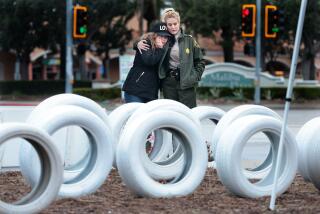Bush Signs Transportation Bill, Says It Will Deliver Jobs
- Share via
CHICAGO — President Bush signed the $286.5-billion transportation bill Wednesday, saying it would ease traffic congestion throughout the country, create hundreds of thousands of jobs and impose stricter vehicular safety standards that would save lives.
But critics said the legislation was stuffed with unnecessary and expensive projects that benefited only members of Congress seeking hometown support.
In California, the measure will fund more than 350 transportation projects, including the completion of highway interchanges and the construction of bicycle paths.
The six-year bill, the first major transportation spending measure since 1998, pays for projects from fiscal years 2004 through 2009. The previous highway bill expired Sept. 30, 2003, and Congress repeatedly passed funding extensions for projects until it could agree on legislation.
After years of delay over the amount of spending and the division of funds among states, the bill cleared the House and the Senate last month by large bipartisan votes. But some lawmakers and government watchdog groups expressed outrage over the number of individual projects -- more than 6,000 -- in the legislation.
The bill’s price tag was $2.5 billion higher than Bush had requested.
“Our economy depends on us having the most efficient, reliable transportation system in the world,” Bush said during the signing ceremony at a Caterpillar Inc. plant in Montgomery, Ill., about 40 miles west of Chicago.
But “highways just don’t happen,” the president said. “People have got to show up and do the work to refit a highway or build a bridge, and they need new equipment to do so. So the bill I’m signing is going to help give hundreds of thousands of Americans good-paying jobs.”
He described the legislation as “more than a highway bill; it’s also a safety bill” -- an assessment with which Joan Claybrook, a longtime auto safety advocate, agreed.
Claybrook said the bill’s provisions “could produce the most significant safety enhancement since air bags were required” in the 1991 highway bill and could “literally save thousands of lives and prevent untold suffering.”
The biggest effect, she said, will come from addressing the two deadliest types of accidents, rollover and side-impact crashes, which kill about 20,000 people each year and injure more than 17,000.
The legislation, Claybrook said, requires the National Highway Traffic Safety Administration to create by April 2009 a stability standard designed to prevent rollovers and to update its 34-year-old roof strength standards.
Said Bush: “This law makes our highways and mass transit systems safer and better, and it will help more people find work.”
Among the projects earmarked for California are about $150 million to improve railroad corridors in the Los Angeles area, $58 million to strengthen the Golden Gate Bridge and $15.8 million to study the feasibility of a new transportation corridor -- possibly a tunnel under the Cleveland National Forest -- between the Inland Empire and Orange County.
Also in Los Angeles, the measure provides $130 million to add carpool lanes on the San Diego Freeway through the Sepulveda Pass, $9 million for a new connector between the Golden State and Antelope Valley freeways, and $9.6 million for offramp improvements on the Pomona Freeway. More than $5 million is allocated for projects related to the long-fought extension of the Long Beach Freeway through South Pasadena, including a feasibility study of building a tunnel.
In Orange County, Fullerton will receive about $13 million to build a railroad overpass on State College Boulevard. Placentia will receive about $37.5 million to improve a railroad corridor through town. An additional $5.2 million has been made available for new interchanges and carpool lanes on the Garden Grove Freeway.
Elsewhere around Southern California, San Bernardino County will receive about $20 million to improve roads and highways around the former Norton Air Force Base. In addition, the legislation allocates $9 million to build an access tunnel to the North Island Naval Air Station in Coronado. Riverside County will receive $8 million for a new interchange on Interstate 15 at Cajalco Road.
One of the biggest critics of the bill was Sen. John McCain (R-Ariz.), one of four senators who voted against it. He said the estimated $24 billion that lawmakers directed to special projects was “egregious.”
More to Read
Get the L.A. Times Politics newsletter
Deeply reported insights into legislation, politics and policy from Sacramento, Washington and beyond. In your inbox twice per week.
You may occasionally receive promotional content from the Los Angeles Times.









